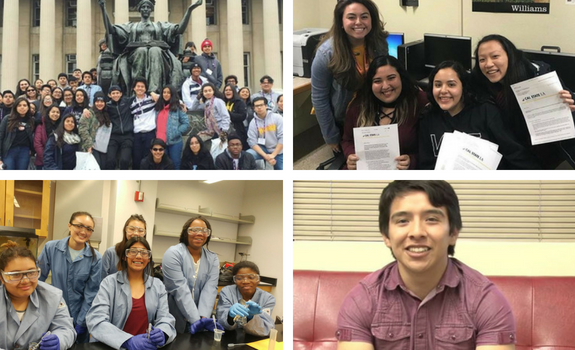With May comes Spring flowers, the anticipation of summer fun and high school seniors’ highly anticipated college admission letters. But not all high school seniors’ educational experiences are created equal, which is why Community Partners is proud to support our projects working to improve access to college for all students.
Even the highest-achieving students need help preparing for and managing their way through the often bewildering process of SAT and AP testing, applications, essay-writing and financial aid – particularly those public school students from lower income, immigrant families. This has been the focus of College Match, which maintains a 100 percent success rate in seeing their participants accepted into four-year institutions, three-quarters of which are top 25-ranked.
“These are excellent students, the brightest!” enthuses Harley Frankel, who founded the project in 2002. “They just don’t have the kind of support and understanding of the process that their wealthier, more connected peers have. College Match helps to bridge that gap.” In just the last four years, College Match helped 153 students get accepted to UC Berkeley, 141 into Middlebury, and 68 went to either Harvard, Stanford or Brown. The other 685 admissions are just as impressive.
While high-achieving students certainly deserve to be celebrated, Arif Haji has made it his mission to develop the talents of the “forgotten majority in college access, the kids who have a 2.5 to 3.5 GPA.” In its third year, College Access, Readiness and Success (CARS) has been a welcome addition at Leuzinger High School, a Title I school in the South Bay where most students are first in their family to attend or complete high school. CARS is a five-year program that supports students from their freshman year of high school through their freshman year of college. CARS’ program not only strives to assist students academically with after-school tutoring twice a week and a summer STEM program, but to also help them develop a better understanding of what it takes to get into a four-year institution. “I was a 3.5 GPA student at Leuzinger High School and it’s not because I didn’t want to go to college, it’s because I didn’t know what was required to attend college. CARS aims to teach these parents and these kids what it takes to attend a four-year institution because they don’t know what they don’t know,” said Haji.
In the city of Montebello first-generation students do not have the advantage of having a parent who can guide them through the college admission process nor advise them on what they need to do to get there. A full 89 percent of area students are at the federal poverty level and 75 percent of their parents did not attend college. It was these factors that led Dan Clement to create College Bound Today and connect students with mentors that are passionate about higher education. In their sophomore-year, students are placed in groups of 10, each of which is guided by three mentors. “We are a completely volunteer-run organization,” says Clement, “We currently have 350 volunteers who spend one Saturday a month at a Montebello high school and of those, 120 are alumni students who are now mentoring kids at their former high school.” In addition to connecting students to role models who will guide them through the process, College Bound Today exposes students to college life and provides five college tours to UC and CSU campuses and a free 30-hour SAT prep course. A full 99 percent of College Bound Today students are accepted into college thanks to a community that is equipped to support them.
One of the biggest hurdles first-generation students face is navigating their way through college culture amongst their advantaged peers, which is why programs that support this huge transition are vital to student success. Helping to connect and amplify the work of these and at least 70 other college access programs across the region is the Southern California College Access Network (SoCalCAN). In addition to the important work of keeping their member groups connected, informed, and engaged in advocacy for the benefit of the many low-income, disadvantaged and undocumented students their member groups serve, SoCalCAN also created a program that addresses students needs after they’ve been accepted onto college campuses. A network of college students offering peer-to-peer support as they journey through their college careers, Level Up students come from similar backgrounds and the majority are navigating the unknown and “the goal is that they persist,” notes program manager Rudy Torres. A first-generation college student himself, Torres was a beneficiary of College Match. “I would not have made it through the school that I went to back on the East Coast had it not been for my mentors. I felt the inequity in class, I felt it outside of class—even on the first day of orientation I noticed I was one of the only students of color in that space. It was very hard and seeing that inequality in college access is what inspired me to get involved in this work.”





